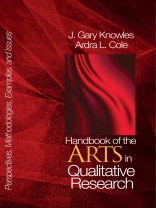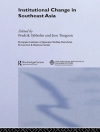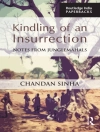‘This work′s quality, diversity, and breadth of coverage make it a valuable resource for collections concerned with qualitative research in a broad range of disciplines. Highly recommended.’ —G.R. Walden, CHOICE
The Handbook of the Arts in Qualitative Inquiry: Perspectives, Methodologies, Examples, and Issues represents an unfolding and expanding orientation to qualitative social science research that draws inspiration, concepts, processes, and representational forms from the arts. In this defining work, J. Gary Knowles and Ardra L. Cole bring together the top scholars in qualitative methods to provide a comprehensive overview of the past, present, and future of arts-based research. This
Handbook provides an accessible and stimulating collection of theoretical arguments and illustrative examples that delineate the role of the arts in qualitative social science research.
Key Features
- Defines and explores the role of the arts in qualitative social science research: The Handbook presents an analysis of classic and emerging methodologies and approaches that employs the arts in the qualitative research process.
- Brings together a unique group of scholars: Offering diverse perspectives, contributors to this volume represent a wide range of disciplines including the humanities, media and communication, anthropology, sociology, psychology, women′s studies, education, social work, nursing, and health and medicine.
- Offers comprehensive coverage of the genres employed by qualitative researchers: Scholars use multiple ways to advance knowledge including literary forms, performance, visual art, various types of media, narrative, folk art, and more.
- Articulates challenges inherent in alternative methodologies: This volume discusses the issues and challenges faced when employing art in research including ethical issues, academic merit issues, and even funding issues.
Intended Audience
This is an essential resource for any scholar interested in qualitative research, as well as a critical resource for all academic and public libraries.
قائمة المحتويات
Part I: Knowing
Chapter 1: Art and Knowledge – Elliot Eisner
Chapter 2: The Art of Indigenous Knowledge: A Million Porcupines Crying in the Dark – Thomas King
Part II: Methodologies
Chapter 3: Art-Based Research – Shaun Mc Niff
Chapter 4: Visual Images in Research – Sandra Weber
Chapter 5: Arts-informed Research – Ardra L. Cole and J. Gary Knowles
Chapter 6: Arts-based Research – Susan Finley
Chapter 7: A/R/Tographers and Living Inquiry – Stephanie Springgay, Rita L. Irwin, and Sylvia Kind
Chapter 8: Lyric Inquiry – Lorri Neilsen
Part III: Genres
Chapter 9: Creative Non-fiction and Social Research – Tom Barone
Chapter 10: Interpretive Biography – Norman Denzin
Chapter 11: Heartful Autoethnography – Karen Scott-Hoy and Carolyn Ellis
Chapter 12: Métissage – Cynthia Chambers and Erika Hasebe-Ludt with Dwayne Donald, Wanda Hurren, Carl Leggo, and Antoinette Oberg
Chapter 13: Fiction – Stephen Banks
Chapter 14: Poetry – Carl Leggo
Chapter 15: Dance and Choreography – Donald Blumenfeld-Jones
Chapter 16: Performative Inquiry – Ronald J. Pelias
Chapter 17: Ethnodrama and Ethnotheatre – Johnny Saldaña
Chapter18: Readers’ Theater – Robert Donmoyer and June Yennie Donmoyer
Chapter 19: Music – Liora Bresler
Chapter 20: Painting – Graeme Sullivan
Chapter 21: Photographs – Claudia Mitchell and Susan Allnutt
Chapter 22: Collage – Lynn Butler-Kisber
Chapter 23: Textu(r)al Sculpture – Alex F. de Cosson
Chapter 24: Installation Art – Ardra Cole and Maura Mc Intyre
Chapter 25: Video – Janice Rahn
Chapter 26: Blogs – Robert Runte
Chapter 27: Zines – Troy Lovata
Chapter 28: Radio – Christine Mc Kenzie
Chapter 29: Community Arts – Deborah Barndt
Chapter 30: Quilts – Helen K. Ball
Part IV: Inquiry Processes
Chapter 31: An Indigenous Storywork Methodology – Jo-ann Archibald
Chapter 32: Literacy Genres: Housecleaning––A Work with Theoretical Notes – Lorri Neilsen
Chapter 33: From Research Analysis to Performance: A Choreographic Process – Mary Beth Cancienne
Chapter 34: Image-based Educational Research: Child-like Perspectives – Jon Prosser and Catherine Burke
Chapter 35: Exhibiting as Inquiry: Travels of an Accidental – Kathryn Church
Chapter 36: No Style, No Composition, No Judgment – Janice Jipson and Nick Paley
Part V: Issues and Challenges
Chapter 37: Performing Data with Notions of Responsibility – Jim Mienczakowski and Teresa Moore
Chapter 38: Ethical Issues and Issues of Ethics – Chris Sinding, Ross Gray, and Jeff Nisker
Chapter 39: Interrogating Reflexivity: Art, Research, and the Desire for Presence – Elizabeth de Freitas
Chapter 40: Art and Experience: Lessons from Dewey and Hawkins – Valerie J. Janesick
Chapter 41: Going Public with Arts-inspired Social Research: Issues of Audience – Tom Barone
Chapter 42: Between Scholarship and Art: Dramaturgy and Quality in Arts-related Research – Kelli Jo Kerry-Moran
Chapter 43: Money Worries: Challenges of Funding Arts-related Research – Ross Gray and Ardra Cole
Chapter 44: Using the Arts to Create a Thesis or Dissertation – J. Gary Knowles and Sara Promislow
Part VI: Arts in Research across Disciplines
Chapter 45: Anthropology – Ruth Behar
Chapter 46: Psychology – Graham E. Higgs
Chapter 47: Women’s Studies – Lekkie Hopkins
Chapter 48: Education – Christine van Halen-Faber and C. T. Patrick Diamond
Chapter 49: Social Work – Adrienne Chambon
Chapter 50: Nursing – Vangie Bergum and Dianne Godkin
Chapter 51: Health-Policy Research – Jeff Nisker
Chapter 52: Disability Studies – Esther Ignagni and Kathryn Church
Chapter 53: Business Studies – Laura Brearley and Lotte Darso
Chapter 54: Sport and Physical Education – Andrew C. Sparkes
عن المؤلف
Ardra L. Cole is a Professor of Creative Inquiry and Adult Learning within the Program of Adult Education and Community Development at the Ontario Institute for Studies in Education of the University of Toronto. She is also a Co-directors of the Centre for Arts-informed Research (CAIR) in the Department of Adult Education and Counselling Psychology. Ardra has published extensively on life history, reflexive, and arts-informed research as well as in the area of teacher education and development. Her co-authored books include: Through Preservice Teachers’ Eyes: Exploring Field Experiences through Narrative and Inquiry (Macmillan); Researching Teaching: Exploring Teacher Development through Reflexive Inquiry (Allyn & Bacon); The Heart of the Matter: Teacher Educators and Teacher Education Reform (Caddo Gap Press); and Lives in Context: The Art of Life History Research (Alta Mira Press). They are co-editors of The Arts-informed Inquiry Series (Series Editor, J. Gary Knowles) which includes: The Art of Writing Inquiry (2001); Provoked by Art (2004); The Art of Visual Inquiry (2007); and Creating Scholartistry (2007) (Backalong Books and CAIR), Ardra has helped many graduate students complete arts-informed doctoral and Master′s degree theses. Graduates furnished work embodying poetic, fictional, performative, and visual arts inquiry processes and forms in addressing educational and social issues. Ardra, along with others, created several installations portraying life in the academy (Living in Paradox) that were installed in numerous professional / research conferences and institutions. Ardra has published extensively in conventional and non-conventional academic prose and in alternative, scholarly, non-print media throughout her career as a teacher educator and qualitative research methodologist. Ardra’s ongoing research (with Maura Mc Intyre) on care and caregiving and Alzheimer’s disease involves multi-media installation–Living and Dying with Dignity: The Alzheimer’s Project, performance–Love Stories about Caregiving and Alzheimer’s Disease, and the World Wide Web–Putting Care on the Map (www.oise.utoronto.ca/research/mappingcare). Her current writing projects include a series of research-based novellas about the teacher education professoriate, But I Want to make a Difference and Of Dogs and Dissertations: Notes on Writing and Life. As she moves through life in the company of dogs, Ardra continues to learn about the meaning of love, loyalty, and living in the moment.












